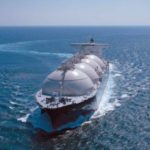The true fuel of the future is collaboration
 The pressure is on. Do you feel it yet? The European Union is targeting climate neutrality by 2050, while China’s deadline is 2060. The US wants greenhouse gas reductions of 50% by 2030, with Japan and Canada close behind (40–45%). The recent Intergovernmental Panel on Climate Change report was nothing short of a clarion call for change. As an industry, there is a very clear direction we are expected to move in – hammered home by the International Maritime Organization’s 2050 and 2100 commitments – but little clarity on how we are meant to get there.
The pressure is on. Do you feel it yet? The European Union is targeting climate neutrality by 2050, while China’s deadline is 2060. The US wants greenhouse gas reductions of 50% by 2030, with Japan and Canada close behind (40–45%). The recent Intergovernmental Panel on Climate Change report was nothing short of a clarion call for change. As an industry, there is a very clear direction we are expected to move in – hammered home by the International Maritime Organization’s 2050 and 2100 commitments – but little clarity on how we are meant to get there.
So how exactly do we fuel the transformation?
It is the question of our generation – and one we have set out to address in our latest Maritime Forecast to 2050 report.
Previous energy transitions were comparatively straightforward. Vessels moved from wind to coal, to steam and finally oil, with a uniformity driven by financial gains. You were either a part of the movement or left to drown in the wake of change.
Now, however, the manifold options are enough to crush the mightiest of craniums. If you are ordering a newbuild today for operation tomorrow, how are you meant to plan a fuel strategy that ensures your vessel remains competitive, compliant and attractive – to a broad range of stakeholders, including charterers and financers – in an environment awash with possibilities?
What is best for you: bio-methanol, liquefied natural gas or synthetic marine gasoil, among others? Will that option still be viable 15, or even five, years into operation?
We cannot wait for certainty
We need action if we are to stand any chance of attaining our goals. Refreshingly, we are already under way. Our Maritime Forecast to 2050 research shows that around 12% of current newbuild orders have alternative fuel systems specified, double the 6% recorded in 2019.
However, with the exception of short-sea electric vessels (chiefly ferries), these ships still employ fossil fuels, with LNG leading the pack as a key ‘transition fuel’ towards tomorrow.
So what do we need to take the next, necessary step?
First, shipping cannot be left on its own to transform. We are part of the wider movement towards carbon neutrality and must be treated that way. Sufficient capital must be allocated to develop alternative fuel infrastructure and supply chains on land, in tandem with the onboard technology necessary to decarbonise.
Shipping cannot be left on its own to transform. We are part of the wider movement towards carbon neutrality and must be treated that way.
Knut Ørbeck-Nilssen
CEO
Cross-sector, regulatory and international collaboration are a prerequisite for broad-based success, with the industrial world coming together to safeguard the natural one.
When it comes to vessel design and fuel choice, we also need to challenge ourselves. But, again, we should not stand alone. Instead, owners should look to informed partners, with dedicated networks and knowledge bases, to correctly assess technology, fuel and the dynamic energy production/infrastructure landscape.
This has been the over-arching focus of our report. With the right assistance, owners can turn uncertainty into confidence and win back clarity from the confusion, addressing a variety of future fuel scenarios and greenhouse gas target trajectories to unlock cost efficient, commercially attractive vessel designs that will not get stranded in tomorrow’s markets.
A flexible fuel approach and an open mind are key here
The challenge in front of us is huge, but the incentive to transform could not be greater – it is survival itself, for both industry and society.
The complexity of the pathway, the multiple forks in the fuel road, might make it easy to get lost, but it also gives us options we can assess, trial and tailor for our individual needs. And this is an opportunity.
By working together as an industry (and beyond), embracing fuel flexibility and consulting with expert partners, such as class, shipping can, and indeed must, reach its destination.
The true fuel of the future is collaboration.
Source: DNV, https://www.dnv.com/expert-story/maritime-impact/The-true-fuel-of-the-future-is-collaboration.html

 Hellenic Shipping News Worldwide Hellenic Shipping News Worldwide, Online Daily Newspaper on Hellenic and International Shipping
Hellenic Shipping News Worldwide Hellenic Shipping News Worldwide, Online Daily Newspaper on Hellenic and International Shipping






















 PG-Software
PG-Software